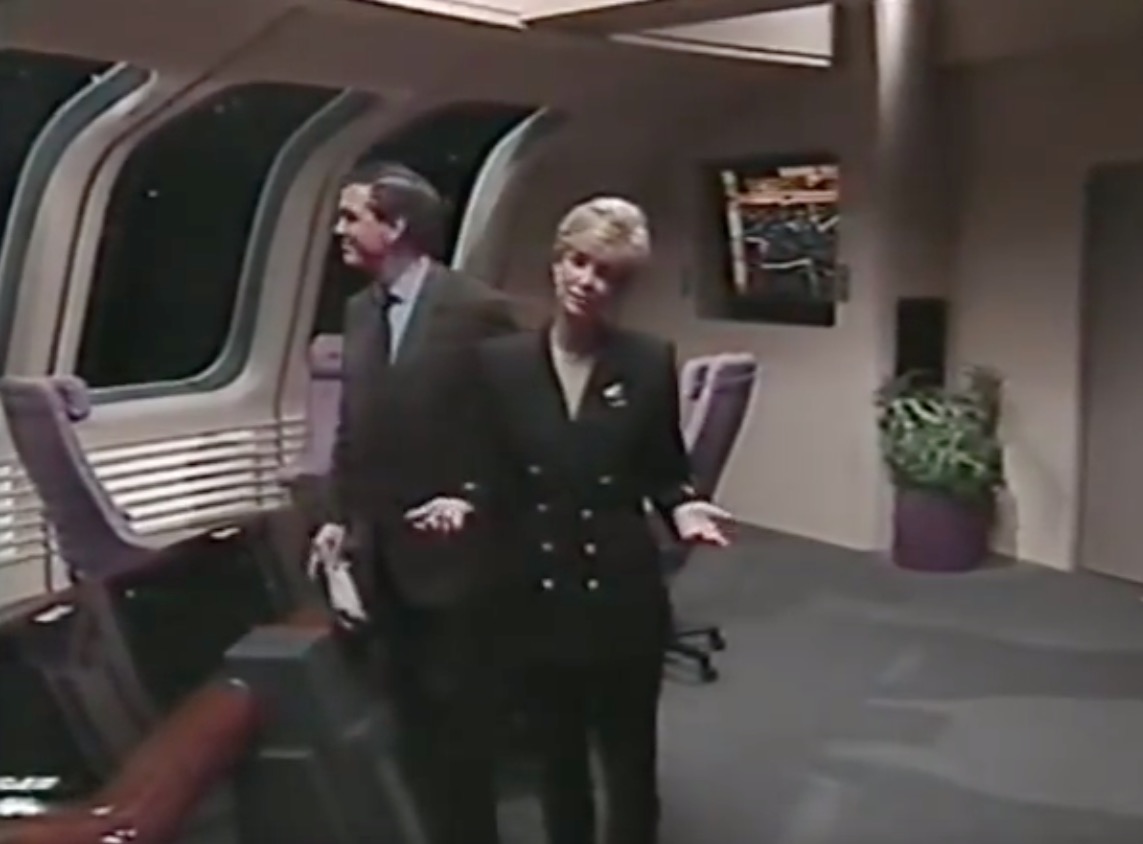
How The Next Generation Ruined a Generation

Here's a free tip for you weirdos like me who still use private torrent trackers. If you want to earn consistently good upload credit, you only need to seed one show, two at most. Namely, Star Trek: The Next Generation, and Deep Space Nine. Preferably the later seasons on Blu-ray. I'm not sure why this is, but I have a few theories. And what the internet definitely needs is more commentary on Star Trek.
The most obvious reason is that older shows come from a time when there just wasn't as much saturation in the market. Each show could capture a much larger chunk of the audience, both nationally and internationally in syndication. This is reflected in their long-term staying power by way of nostalgia. If you investigate the top seeded torrents on a decent tracker, for content from the late 80s and early 90s, you will find that the top spots are usually captured by season packs of The Simpsons, Seinfeld, and once it appeared in 1994, Friends, which is no surprise at all if you lived through those years.
In between these behemoth shows, you will also spot the other consistent trend, namely the Treks. It shouldn't be a surprise that torrent sites are frequented by nerds with nerdy interests, but what is noticeable is that in the years where they have to compete, Treks rank consistently at the top, higher than even cult classic The X-Files. This was a show which was far less embarrassing to be seen watching at the time, scheduled explicitly for adults, with its two iconic leads, its clever appropriation of deep state intrigue, and an at times fearless exploration of the grotesque and macabre.
If you look up the US viewership numbers, X-Files had about twice as many on average as TNG, ~20 million vs ~10 million. It was clearly the more popular show. Compared to today though, TNG consistently exceeded even the premiere of Star Trek: Discovery 30 years later, at 9 million viewers, despite the fact that the US population has grown by over 30% since, and that Trek is now mainstream.
You could argue that The X-Files sabotaged itself for re-watching, by blue-balling its audience, offering tantalizing Lost-style glimpses of a larger mythos that ultimately didn't go anywhere. It's also hard to ignore that the cultural interest in UFOs and aliens vanished almost entirely once everyone had a digital camera in their pocket. However, most of the X-Files didn't even involve aliens, and instead featured an unrelated mystery-of-the-week. The overall quality is definitely more consistent than TNG too.
It's easy to forget just how out-of-touch culture was with popular science fiction at the time, now that nerds are cool. Luckily there is a wonderful time capsule to remind us, in the form of an episode of Good Morning America from 1992. In this show, cringe inducing for any Trek fan, the set of the USS Enterprise is host to a cast of TV anchors out of their depth. They marvel at the decor, the whacky aliens and costumes, the futuristic props and consoles, the trekkie lingo, and so on. Throughout it's pretty obvious that none of them have ever actually watched the show. This is also why Patrick Stewart doesn't appear: he refused, insulted by the disrespect they had for the material.
By then the show was in the middle of its fifth season, and had featured episodes with numerous serious, well-executed topics. The Measure of a Man debated the human rights of Data, the sentient android, in a court room setting. Who Watches the Watchers explored the policies of non-interference with primitive cultures, the immorality of false deities, and the power of the scientific method. Sins of the Father challenged the notion of inherited sin in an honor-based culture, as well as the fish-out-of-water aspects of an exile in his own culture. The High Ground was about terrorism and how people are driven to it by desperation, not broadcast in Ireland at the time, ostensibly due to a throwaway line about Irish unification. Darmok was a prescient linguistic take on the memes we now take for granted. There was also the legendary season-cliffhanger The Best of Both Worlds, in which Picard was abducted by his mortal enemy, and forced to do their bidding in conquering humanity.
None of this is even remotely featured in the few clips shown, and instead they show meaningless treknobabble, some phasers and torpedoes, Deanna Troi sensing nothing (as usual), and a dry explanation of asphyxiation in a vacuum. The interviews with the cast members mostly revolve around trivia, from how long it takes to do their makeup to whether they get recognized on the street. Gates McFadden, to her credit, manages to salvage every bit she's in. At one point, an anchor does say the show addresses more serious topics, but then she fails to mention any, stalling the conversation with some awkward glances. Granted, this was an early morning show mainly designed to fill air time, mixed with a presidential election (health care costs are rising!) and some disastrous weather, but even then this is painfully embarrassing.

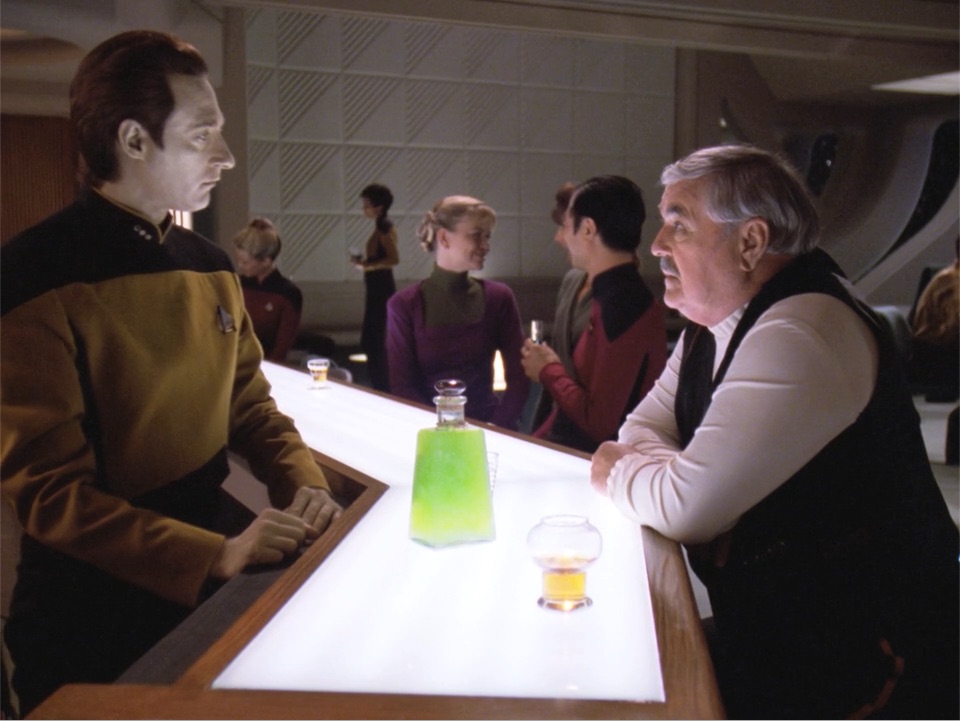
When she asks the cast whether they think they'll be as famous as the original Trek characters, and whether this will define their careers, Jonathan Frakes says he's just happy to have a job. Marina Sirtis says she thinks it's unlikely she'll still be wearing the uniform 25 years later. Well, technically it ended up being only 10 years, but she's still doing Trek conventions today. Clearly they didn't think what they were doing was remotely as iconic as the original, and the exact opposite is true.
The original Trek is too awkward, too out of touch to watch today, so instead it has been pilfered and repurposed, turning its characters into hot, juvenile blowhards in JJ-Trek. But TNG endures on its own terms, and what's more, its dorky PADDs and omnipresent touch screens turned out to be prophetic. It's fascinating to rewatch today, and realize that eating lunch while holding a tablet is an entirely normal thing now. This is only slightly marred by the fact that they still treat them like pieces of paper, handing over the device instead of just transferring a file. I guess the DRM is really bad in the future.
So why on earth do I think TNG ruined a generation? If it wasn't obvious, I love this show. I still have the collectible card game in a box right behind me.
It has to do with the way they staged their moral dilemmas, because there are two kinds of Trek episodes.
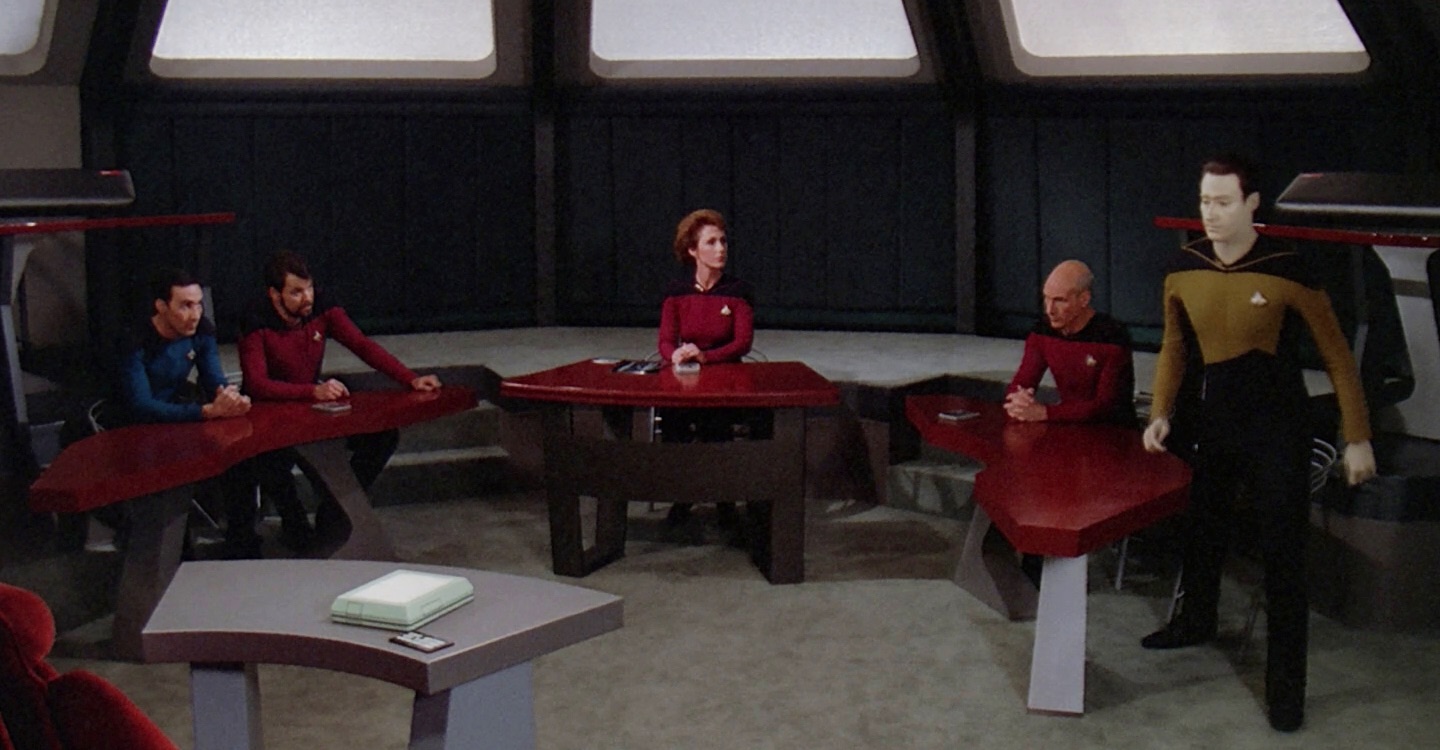
In the first kind, Type 1, a moral dilemma happens to a character. Data's rights are threatened. Worf's honor is at risk. Picard's dignity has been stripped. Or as in The Drumhead, one of the best episodes, the Enterprise's own crew participates in an investigation that turns into a bona-fide witch hunt. These are the good ones, because they start with real characters and put them in credible jeopardy. Secondary characters are fleshed out as well, with conflicting views and interests, and serve to challenge the assumptions the show and its main characters embody.
In the second kind, Type 2, there is a planet or a species, with a unified culture and philosophy. This is usually centered around one particular extreme. The Ferengi are greedy chauvinists. The Sheliak are xenophobic supremacists. The J'naii are monogender puritans. The species is a trope, a stand-in for an Other who is Different, and the full implications of this conceit are never actually fleshed out. In pretty much every case, the crew is tasked with outsmarting them, and to demonstrate that their values, morals or tactics are better, even if it takes a while to figure out how and why. The drama is a result of fighting this good fight, and results in either a moral victory or defeat. But the matter of which side was right is never in question. The underlying assumption is pretty hard to miss: people who look a certain way act a certain way, and judging the book by its cover is correct. These episodes are actively and shamelessly racist.
Of course it's not a completely rigid binary. The goofy Ferengi of TNG ended up being fleshed out more in DS9, though they never managed to fully escape from the shadow of caricature. The DS9 Cardassians remained unrepentant imperialists, with only the odd exception presented as one of the few "good ones." On the other hand, some brief planets-of-the-week ended up hosting a variety of characters and factions, and let them speak fully for themselves. But the dichotomy still exists, and it's bizarre that the two kinds of stories live together under the same roof.
It's particularly noticeable given the emphasis the show placed on empathy, in the form of Deanna Troi. She was the left hand of the captain, a character whose main function was to sense and regulate people's feelings, and the perfect embodiment of the New Age beliefs popular at the time.
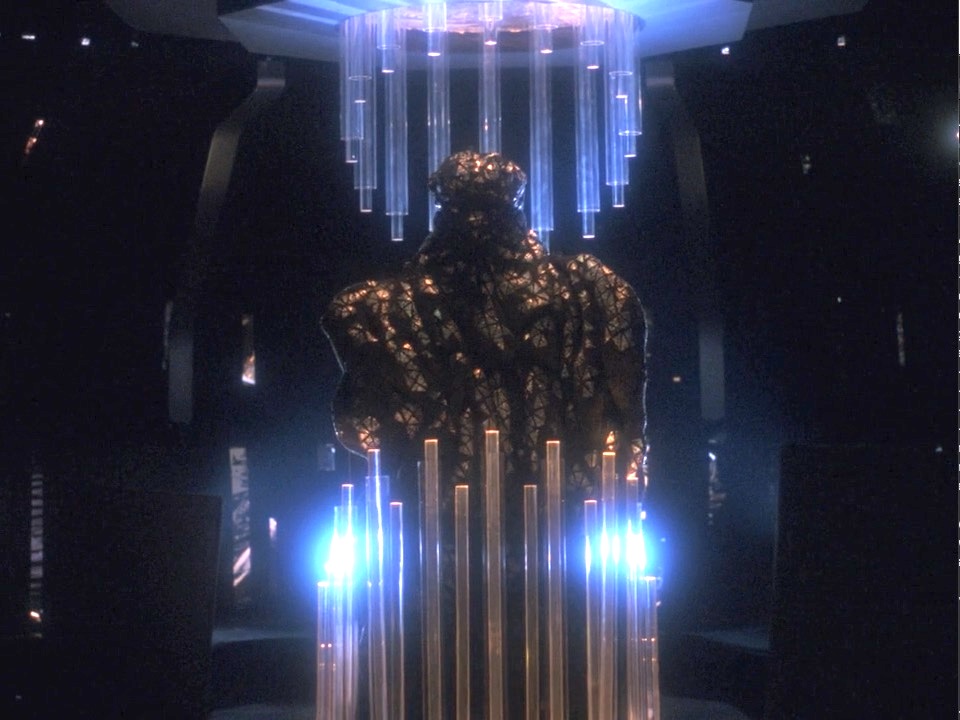
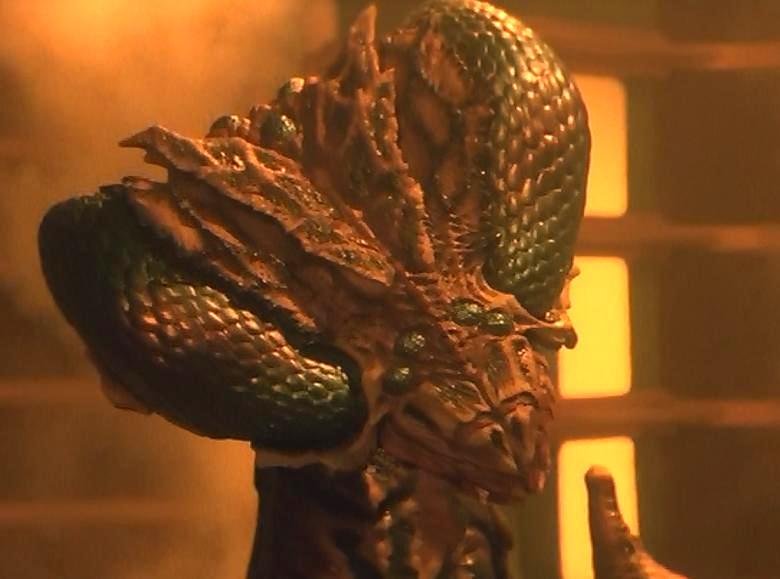
Empathy is actually a pretty difficult aspect of televised sci-fi. A classic complaint is that almost all the aliens are humans with bumpy foreheads, and this is true, but also entirely necessary. Whenever shows have featured distinctly non-humanoid characters, it weirds people out, because we can't read them at all. Like the aforementioned Sheliak, whose inhuman mime telegraphs no useful information, an aspect which was actually pertinent to the story. For the most part, Trek has wisely avoided this trap. Other shows tried and failed, like Babylon 5, which featured an insectoid crime boss whose animatronic chittering and spasms completely failed to intimidate. It was quietly shelved in subsequent seasons.
As a result, any show that is all about meeting strange new aliens on strange new worlds actually puts an incredibly high premium on human emotions and human behaviors, and can only explore them in two ways... first, by making the aliens just like humans, with the same moral failings, ideological disagreements and conflicting interests, which makes them not aliens... or two, by making the aliens inhuman in some way, and hence somewhat incomprehensible, which automatically otherizes them and makes their way of life undesirable. Unless the writers make an effort, they're not actually going to challenge the audience's preconceptions at all. Less ambitious sci-fi shows like Stargate SG-1 run almost entirely on this formula, contrasting the plucky always-right hero team with the backwards primitives they must liberate and the alien villains who hold them hostage.
When this becomes the lens that you use to relate to Others, you're not actually relating at all.
As tentative evidence that this is a real thing and not just some cultivation theory in disguise, I offer the closest thing we have to a TNG reboot, The Orville. Created by bona fide uber-trekkie Seth McFarlane, you'd expect it to embody all the good parts of TNG. Yet the show had a few whopper Type 2 episodes in its first season, and no real Type 1s. This should be supremely remarkable, and yet has mostly passed by unnoticed, as the people with opinions appear to have confused the trappings of the show it copied for its substance.
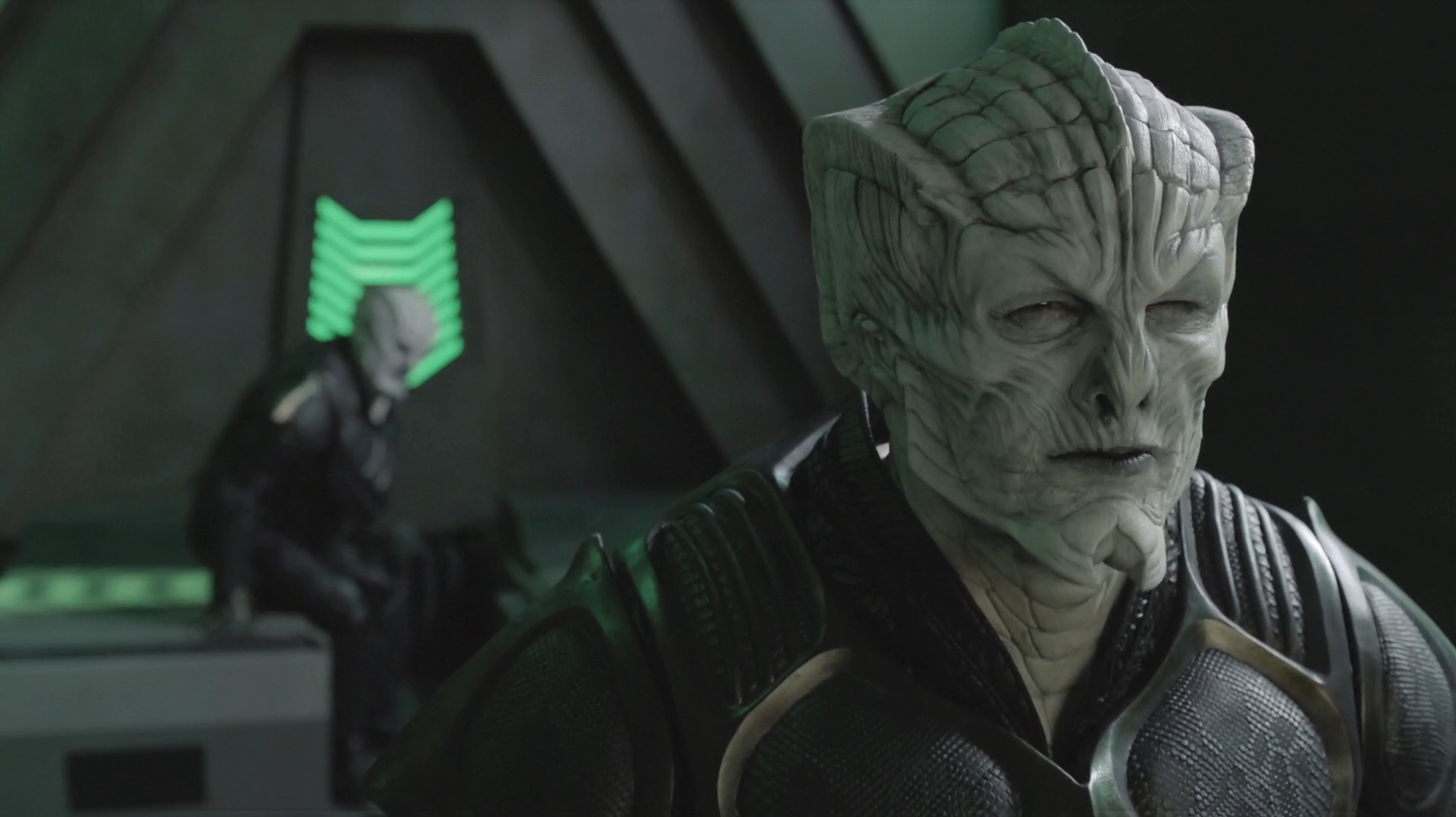
In Krill, the captain and his pilot infiltrate an enemy vessel in disguise. They blunder through, bluffing their way through conversations only the dumbest adversary could not suss out. They do this without taking any of the expected precautions, and they end up winning by doing the equivalent of setting the aliens' thermostat to 100ºC and boiling them alive. Yes, this show actually wants you to believe that aliens who are extremely light-sensitive would put lethal light bulbs on their space ships and just never turn the dimmer up past 5%. They're religious fundamentalists though, and we all know how stupid they are, right?
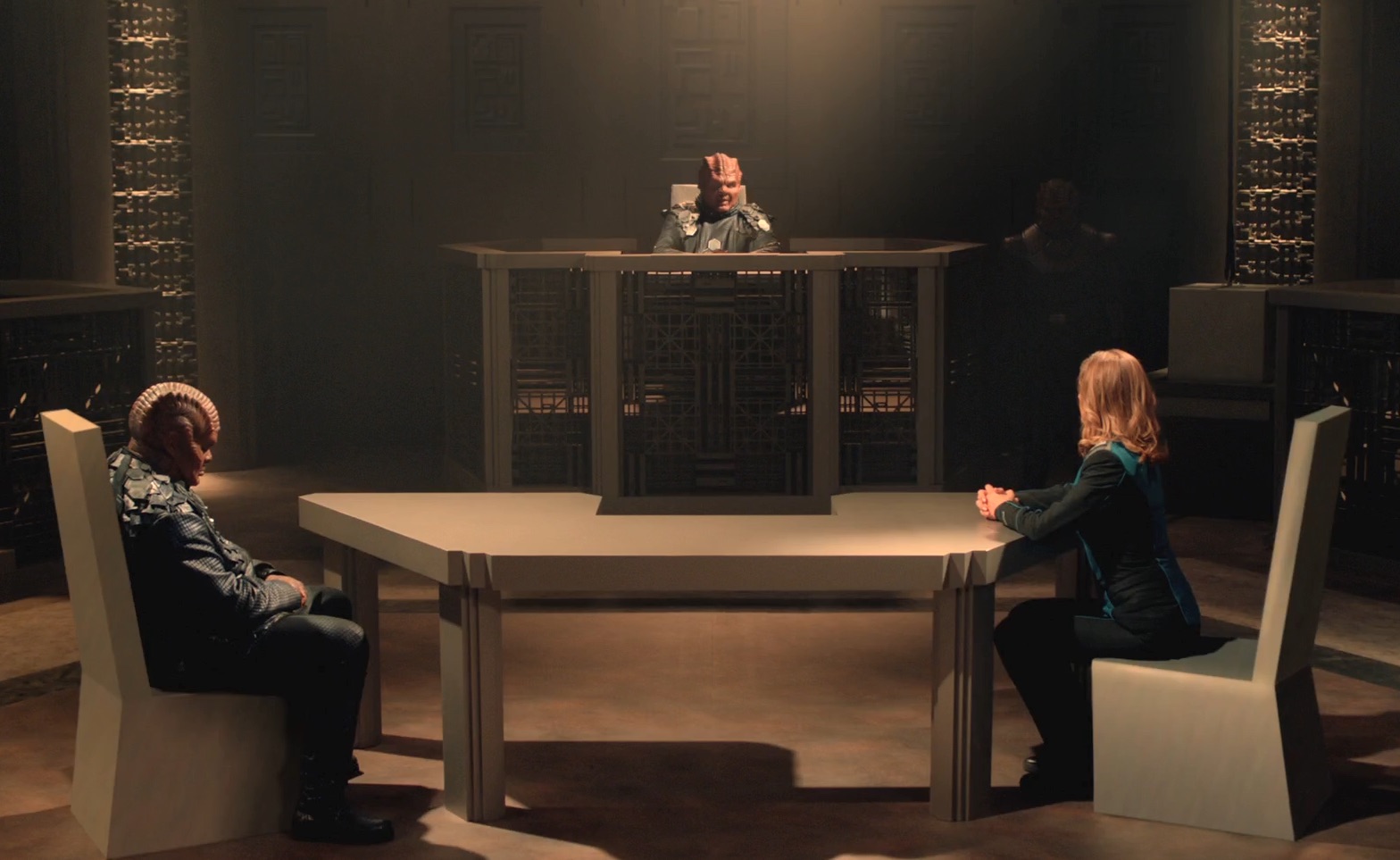
In About a Girl, the show seems to imitate both TNG's occasional court room proceedings and gender morality plays. It features a trial over whether a newborn girl should be allowed to remain female, in a species of male chauvinists who make the Ferengi seem downright tolerant. The amazing part is that the supposedly devastating argument, made by the female second-in-command who is counsel for the defendant, is based on easily dismissed false equivalences, assumed superiority and non-sequiturs. She ought to have them howling with laughter in minutes. Instead, this society of aliens who don't take women seriously takes this woman's poor excuse for reason and logic entirely seriously. Because sexism is bad, you guys.
The second season managed to bring a little bit more substance and new material, but couldn't drop the habit completely, in the form of All the World Is Birthday Cake. It's about a planet of astrologers, who rigidly organize their society according to horoscopes by birth sign, including a particular class of untouchables. The resolution comes from the main characters outsmarting them with a non-credible deception, which a first year physics student could poke numerous holes in. To add insult to injury, the writers apparently don't know the difference between a satellite and a satellite dish. Fuck yeah science! Astrology is dumb!
It feels more like Team Earth: Galaxy Police than Star Trek: The Funny Generation, only the satire isn't intentional, and isn't mocking who they think it is. Nevertheless its first season won a "Best Science Fiction Television Series" award.
If that's what TNG's legacy looks like in 2019, then I'm afraid some people have missed the point entirely.
There's a particular phrase you hear a lot these days. "We're on the right side of history." I'm not saying it's all TNG's fault, but it's hard to imagine how it didn't contribute, given how pervasive Trek references and memes are, even today. There is a similar dichotomy in handling moral dilemmas... whether we look for nuance to understand one of our own who is struggling, or whether we consider someone an outsider, representative of a foreign monoculture, and which needs to be outsmarted and defeated, ideally using their weaknesses against them. Both approaches live under the same roof of compassion, empathy, justice and progress, despite being polar opposites.
The real lesson was that principles are important, vital even. But they must be moderated, by checking ourselves before we chastize others.
